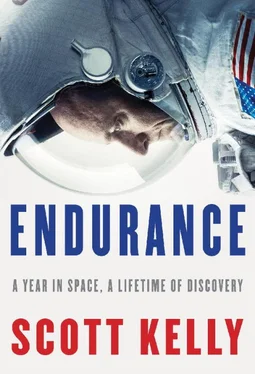“It’s too bad we won’t launch today,” I said.
“ Da, ” Sasha agreed. “We will be first crew to scrub after strapping in since 1969.” This is an incredible statistic, considering how often the space shuttle used to scrub, right up to the seconds before launch, even after the main engines had lit.
A voice from the control center interrupted us. “Guys, start your Sokol suit leak checks.”
What? Sasha and I looked at each other with identical What-the-fuck? expressions. We were now inside five minutes to launch. Sasha raced to get strapped back into his seat properly. The emergency escape system had been activated, and if something had set it off, the rocket would have launched us away from the pad without warning. Sasha would have likely been killed if it had activated while he was not strapped in. We closed our visors and rushed through the leak check procedures. With less than two minutes to spare, we were ready to go. We settled into our seats for our last minutes on Earth.
The launch experience was different from the shuttle—the Soyuz capsule was much smaller than the shuttle’s cockpit, and less advanced, so there was less for the crew to do. Still, it was much more automated than the space shuttle was. Nothing could match the acceleration of the shuttle’s solid rocket boosters pushing us away from the Earth with an instantaneous 7 million pounds of thrust at liftoff, but anytime you rocket off the planet, it’s serious business.
Once we reached orbit, we were stuck in this cold tin can with very little to do for two whole days until we were to dock to the space station. As the spacecraft moved in and out of communication coverage, the sun rising and setting every ninety minutes, we quickly lost track of any normal sense of time and drifted in and out of sleep. The habitation module was cramped and spartan, lined in a dull yellow Velcro with an occasional exposed metal frame or structure, which quickly became covered in condensation. We didn’t even have a good view of the Earth because the Soyuz constantly spun to keep the solar arrays pointing at the sun in order to charge its batteries. I had brought my iPod, but the battery soon died. I spent most of the time floating in the middle of the habitation module, feeling like I did when I was a kid in after-school detention, staring at the clock, waiting for the day to be over. When docking day came, I was excited, but when I looked at my watch and realized the moment we were to float through the hatch was still eighteen hours away, I thought to myself, Oh, shit. What the fuck am I going to do for the next eighteen hours? The answer is: nothing. I just floated there. I’ve said that any day in space is a good day, and I believe it, but two days in a Soyuz is not that good.
This was also Amiko’s first time seeing me launch into space. She had witnessed three previous shuttle launches, including one of my brother’s, before I knew her well. (She remembered seeing me at a prelaunch party in Cocoa Beach, Florida, carrying around a sleeping baby Charlotte with her head of curly blond hair.) So she wasn’t new to the launch experience, but it was different traveling to Baikonur and seeing the Russian way of doing things. And of course it was very different seeing a launch with someone she cared about on board. My brother told me later, once I was safely in orbit, that she cried while watching my launch. I was surprised to hear that because, despite the fact that we had been together for more than a year, I had never seen her cry. When I asked Amiko about it, she said she hadn’t been expecting to be so emotional, but she was moved by the beauty and awe of the launch and by her happiness for me. She knew what it meant to me to get to fly in space, and she knew how hard I had worked to get there.
Years later, I learned more about what went on that day in the launch center in Baikonur. Someone in launch control had said that they understood this anomaly, and that there was a workaround: cycling the oxygen valve partially open, then closing it before opening it fully to reseat a sticky valve. In the minutes before launch, officials were passing around a piece of paper they needed to sign indicating that they were go for launch in spite of the oxygen leak and Sasha’s struggle to equalize the pressure as time ticked away. As a crew member getting ready to ride the rocket to space, I found this to be troubling.
—
WHEN I FLOATED through the hatch to officially join the crew of Expedition 25 on the ISS, I was elated to be starting a long-duration mission. It had been a long road from DOR, backup on Expedition 5, the Columbia accident, my STS-118 mission, prostate cancer, my second backup training flow, and now my prime assignment—ten years all told.
On board were two Americans and one Russian: Doug Wheelock was serving as the commander for this expedition and would be turning over ISS to me when he left. Doug was a great first ISS commander to serve under. He took a hands-off approach to leadership, letting everyone find his or her own strengths.
My other American crewmate was Shannon Walker. I didn’t know Shannon very well before this mission, but I was surprised by how different she looked when we met in space: her hair had grown out gray over the months she’d been in space without access to hair dye. Shannon had trained to fly in the left seat of the Soyuz, which meant she needed to know the systems well enough to take over in an emergency that might incapacitate the Russian Soyuz commander, and as a result she spent much more time training in Russia than I did. When I got on board ISS, I was impressed with her abilities as a crew member. This was her first flight, so when I arrived I was at first thinking of her as a rookie, but it didn’t take long for me to realize that she had almost ten times as much time in space as I did, and that in fact I could use her help. At NASA, we talk about “expeditionary behavior,” which is a loose term for being able to take care of yourself, take care of others, help out when it’s needed, stay out of the way when necessary—a combination of soft skills that’s difficult to define, hard to teach, and a significant challenge when they are lacking. Shannon was a master at this.
The Russian cosmonaut Fyodor Yurchikhin, a short, stocky guy with a broad smile, was already on board. Fyodor was one of only two people I’ve been in space with more than once (the other being Al Drew). Fyodor was born in the country of Georgia to Greek parents, which is unusual in a cosmonaut corps made up largely of ethnic Russians. He had a real enthusiasm for photography, and loved taking pictures of the Earth. Even more, he loved showing his pictures to his crewmates regardless of what they were trying to do at the time. The cosmonauts aboard ISS generally don’t have as hectic a schedule as the Americans do, and sometimes that difference can show when they are free to socialize during the day, floating around the dining room table sharing coffee or a snack, while we rush from one thing to the next.
On this mission I learned the differences between visiting space and living there. On a long-duration flight, you work at a different pace, you get more comfortable moving around, sleep better, digest better. As my first long-duration mission went on, what surprised me most was how little force it actually took to move around and to hold myself still. With just a slight push of a finger or a toe, I could travel across a module and wind up exactly where I wanted to be.
One of the first tasks I tackled when I got on board was repairing a device called Sabatier, which combines oxygen from the CO 2the Seedra collects and leftover hydrogen from the oxygen-generating assembly to create water. Sabatier is an important part of the nearly closed-loop environmental system of the station. My job was to tune the system, a tedious multiday task, using flow meters and other diagnostic tools. At the time I thought I handled it well, but looking back at it years later with much more experience doing this kind of repair, I realize how much Shannon helped me by getting all the tools and parts together for me in advance, checking on me when I seemed to be struggling, and encouraging me when I got frustrated. Without her help, the task would have been nearly impossible to carry out so early in the mission.
Читать дальше












